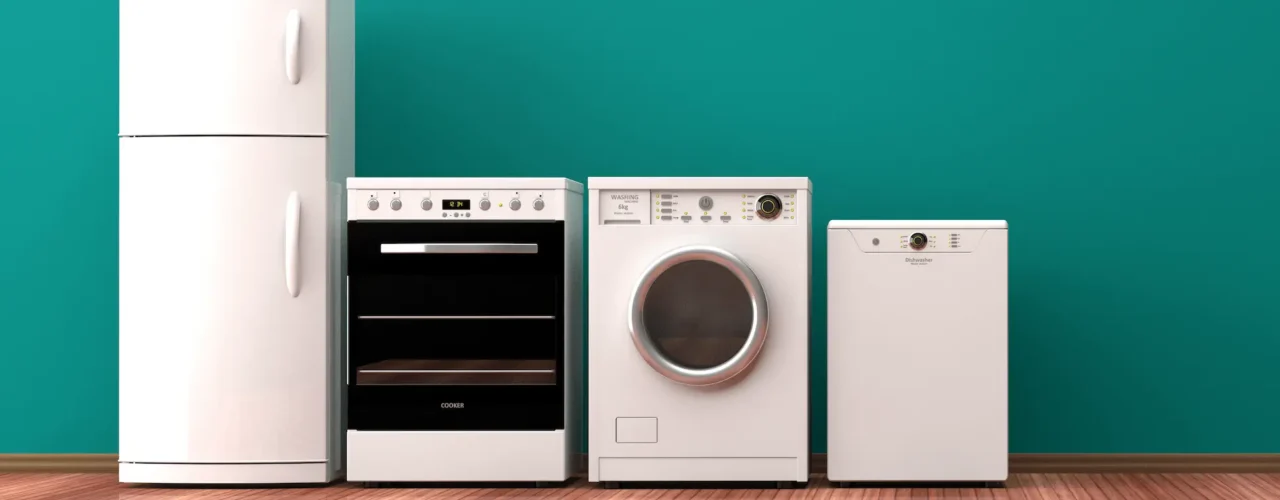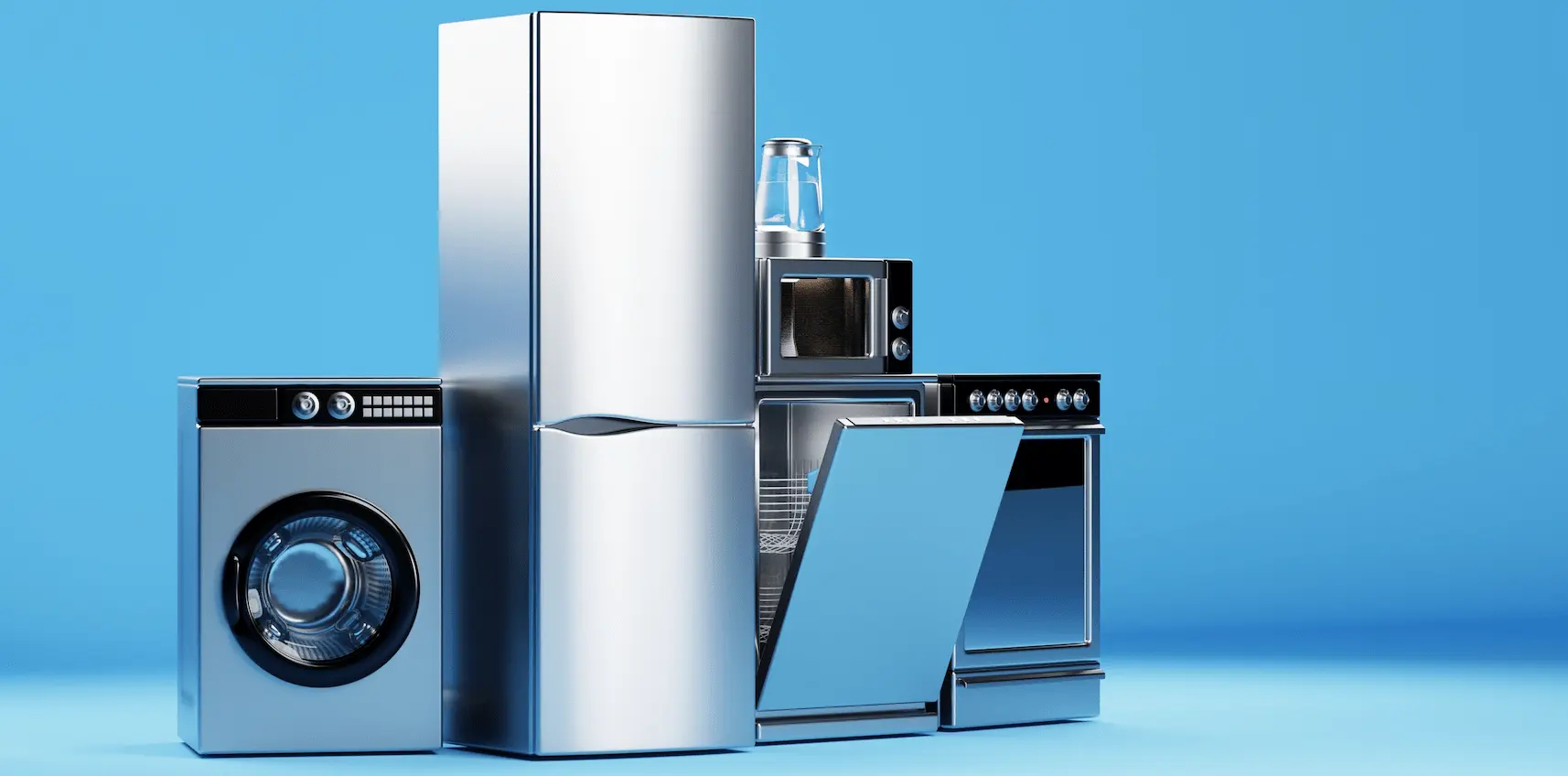
How often do landlords have to replace appliances?
16-07-2025 | Damaged PropertyIn most cases, landlords will provide their tenants with appliances, making them responsible for maintenance and repairs if they break down or cause any issues. But you may be wondering how long you have as a landlord to fix an appliance. Your main focus as a landlord will need to be ensuring tenant satisfaction and safety.
Here, we’ll go through everything you need to take into consideration regarding replacing appliances, including legal expectations and ensuring tenant safety and comfort.

Your responsibility for appliances as a landlord
Appliances are necessary in any rental property, and being able to provide reliable white goods will significantly enhance the appeal of your property, but it’s important to remember that they don’t last forever and that you’ll need to be proactively managing your appliances. This will help you anticipate the needs of your tenants and will keep them safe.
Legal expectations and responsibilities
You may already know that you legally don’t have to provide appliances for your tenants; however, if you do, there will be certain legal expectations.
- Safety first: The Electrical Safety Standards in the Private Rented Sector Regulations 2020 and the Electrical Equipment (Safety) Regulations 2016 state that any appliance you provide needs to be in good repair and not pose any risk.
- The tenancy agreement: You need to make sure that your tenancy agreement outlines who is responsible for the repair or replacement of the appliance. Most of the time, you’ll be the one responsible for this if you provide tenants with appliances.
- Gas safety: You’ll need to ensure any appliances that use gas are checked annually by a Gas Safe engineer.
How long does a landlord have to fix an appliance?
There is no exact period of time in which you need to repair or replace an appliance as a landlord; however, you are expected to carry out repairs within a reasonable timeframe. This reasonable timeframe will depend on the severity of the issue and the type of appliance that needs to be repaired or replaced.
For example, a broken fridge will need to be taken care of a lot quicker compared to a broken microwave.
So, how often do landlords have to replace appliances?
It does help, however, to know the average lifespan of each type of appliance so that you can expect when you’ll need to replace the item. These are estimates, and the amount of time you need to replace an appliance will vary depending on how well the appliance is looked after and how often it is used. Here are estimated time frames:
- Oven/cooker: 10-15 years (gas models often outlast electric ones)
- Washing machine: 10-14 years
- Tumble dryer: 8-13 years
- Fridge/freezer: 10-19 years (single door fridges can last longer, fridge-freezers typically 14-17 years)
- Dishwasher: 9-13 years
- Microwave: 9-10 years
How to know when to replace appliances
Here’s what to look out for when your appliances need to be replaced:
- Frequent breakdowns: Do you need to call for repairs often? If so, replacements may be cheaper in the long run.
- Inefficiency: Is your appliance becoming less energy efficient?
- Outdated models: Is your appliance old and outdated? This can detract from the appeal of your property.
- Safety concerns: Do you notice any safety hazards, such as burning smells or sparks?
Fair wear and tear vs. tenant damage
Once you know if your appliance needs replacing due to fair wear and tear or due to damage caused by your tenants, you’ll be able to determine who is responsible for replacing the appliance. Examples of fair wear and tear may include the natural and gradual deterioration of an appliance due to everyday use, such as scuff marks or slight fading.
Fair wear and tear
Appliances won’t stay new forever, and you can always expect that there will be some wear and tear as time goes on and the appliance is used. Colours fade and scuffing appears, but it is your responsibility as the landlord to address this.
Tenant damage
If there is damage caused by the tenant, however, it will be their responsibility to fix the appliance. Damage could be caused by misuse, intentional actions, negligence, or negligence. You can keep on top of wear and tear and damage by conducting frequent inspections
How to establish responsibility
The best way forward is to make sure that you document everything. This can be done through a thorough inventory report with date-stamped photos or videos. This should be taken at the start of the tenancy, which can then be referred back to at the end of the tenancy agreement or if an issue arises.
Investing in durable appliances
It may be more expensive in the long run, but investing in good-quality appliances is a worthwhile investment in the long run. Here are some of the other benefits of investing in good-quality appliances:
- Reduced long-term costs: Your appliances will break down less often, which means that maintenance costs will be lower over time. Having energy-efficient appliances will contribute to this, too.
- Increased property appeal and rentability: You may also be able to charge your tenants more, as the appeal of your property will increase. This will also help with having periods where your property stands empty.
- Tenant satisfaction and retention: Naturally, your tenants will feel more satisfied with the amount of rent they pay if they understand that they are saving on energy and money.
- Environmental benefits: As mentioned before, having appliances that are durable and energy-efficient means that your property will be consuming less energy.
- Tax relief: As a landlord, you can claim Replacement Domestic Items Relief when domestic items need to be replaced.
Practical tips for landlords
There are a few processes that you can put in place to make sure that you’re being proactive and organised.
1. Documentation
As mentioned earlier in the guide, documenting every detail is one way of making sure you stay proactive. You can do this through:
- Detailed inventory reports: This is imperative for managing disputes and deposits. With inventory reports, you’re able to manage the condition of your appliances and note any existing minor wear and tear.
- Maintenance records: Make sure that you keep a log of the service dates and their repair history.
- Electrical safety checks: Always make sure your EICRs are kept up-to-date. This is important for your property’s fixed wiring every five years.
2. Communication with tenants
Communication is always key when dealing with tenants, but the main thing is to make sure that your tenancy agreement is clear and robust.
- Clear tenancy agreement: Your tenancy agreement needs to highlight how issues with appliances should be dealt with and the responsibilities that come with maintenance and repairs.
- Provide manuals: Make sure that you also leave any manuals for your tenants
- Leave appliance manuals for your tenants, as this will support them in being able to use them properly and in knowing how to maintain them.
- Transparent timelines: communicate clearly with your tenants on expected repair timeframes if an appliance breaks down.
3. Planned maintenance
Ensure that you schedule regular servicing for certain appliances so that you can extend their lifespan. Also, make sure that you factor in appliance replacement into your maintenance budget so that you aren’t met with surprises along the way.
So, knowing how often landlords need to replace appliances will help you manage these appliances in your rental properties. When you understand your legal obligations as a landlord, you’ll be able to make informed decisions, knowing when to repair appliances rather than when to replace them.
Further to this, you’ll be able to enhance the value of your property, maintaining tenant satisfaction and eliminating periods where your property stands empty.
For more information on how to protect your property as a landlord, be sure to visit our resource centre. At CIA Landlords, we have the expertise to find the best landlord insurance deals that are suitable for your needs. Contact us today at 01788 818 670 for a quote!
We won't be beaten on any like for like landlord insurance quote.
Get a quote

